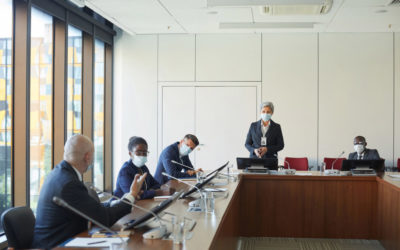STRIKING A BALANCE
between ROI and value when returning to business travel
Many business-to-business and technology companies performed remarkably well during Covid, given the incredibly strong headwinds that they faced. Employees adapted to working from home and maintained productivity. Sales teams still brought in new customers without meeting them face-to-face. Based on this, it’d be easy to say that Zoom has killed business travel. But the evidence shows the opposite.
A recent Emburse/GBTA survey showed that 53% of travel managers anticipate maintaining pre-pandemic levels of travel for sales teams, with a further 8% even increasing the amount of sales-related travel. It’s clear that while video calls will still be heavily used for everyday communications, when it comes to high-value, high-touch interactions, face-to-face is still key.
Any successful sales person can explain why in-person interactions are so important. There are so many things that you can’t do on Zoom. Body language is harder to read. Side-bar chats before or after the formal meeting can’t happen. You can’t quickly pop your head into the office of a decision-maker on the way out of the door. While Zoom levelled the playing field by stopping these for all sales teams, when one company realises that these interactions provide a competitive advantage, others will soon follow suit.
Companies shouldn’t fall into the trap of thinking that ROI and value are the same thing.
On the other hand, the survey suggested that travel not directly linked to revenue generation will be significantly reduced as we emerge from the shutdown. Sixty percent of travel managers think that travel to events and conferences will be lower than before, and an even greater amount – 65% – anticipate that internal travel will be less than pre-pandemic levels.
Eighty-five percent of respondents see “cost control” as one of the most important issues for their travel programmes. So, it’s not surprising that training and team-building travel will be reduced, as it’s far harder to determine tangible return on investment levels than with sales travel.
However, companies shouldn’t fall into the trap of thinking that ROI and value are the same, especially when comparing revenue-generating and non-revenue-generating travel. Many companies have a network of offices, be they in different parts of the UK, across Europe, or even around the world. One of the biggest challenges that many business leaders have cited about working from home is the impact on a company’s morale. When teams do eventually return to the office, re-establishing that culture will be critical for employee retention – especially given that 40% of employees are considering changing jobs this year, according to a Microsoft survey.
A key component of this is ensuring that executives spend time in each location, as re-establishing with employees simply can’t be done as effectively over Zoom. Just like the sidebar conversations in a sales meeting, quick chats by the water cooler or waiting for the kettle to boil can deliver far more insight than a formal, scheduled meeting. While these meetings may be very hard to measure in terms of pounds and pence ROI, the value that they could deliver to a company in terms of improved recruitment and retention may be enormous.
Whilst your T&E solution makes it very easy to track travel spend, and your finance team can determine how effective your sales team members are, leadership shouldn’t forget the human aspect of work. Cost control is certainly important, but don’t let it blind you to the bigger picture.
Travel Expenses Sorted

Gray Dawes have formed an innovative preferred partnership with Certify to offer a simple, end-to-end automated travel and expense management system, from booking a trip through to expense reimbursement. Gray Dawes’ customers can now book travel itineraries that seamlessly integrate with Certify expense management software, making the expense process streamlined and paperless.
LATEST FROM THE BLOG
Explore our most recent articles, covering the latest topics from the best in the business…
2020 Review & 2021 Outlook
In our latest Business Travel Bitesize special including a video and report, we measure the health of corporate travel via the confidence of four key segments: governments, suppliers, businesses and travellers.
Why Bill Gates Is Wrong
Microsoft co‐founder Bill Gates has even predicted that over 50% of business travel will go away permanently now that remote work and virtual meetings have become the norm. Find out why we think he’s wrong.
Pent-Up Demand for Small Meetings
It just may be the small-meetings business that could help the hotel industry overcome challenges presented by the pandemic, economic downturn and, in the United States, even civil unrest.



